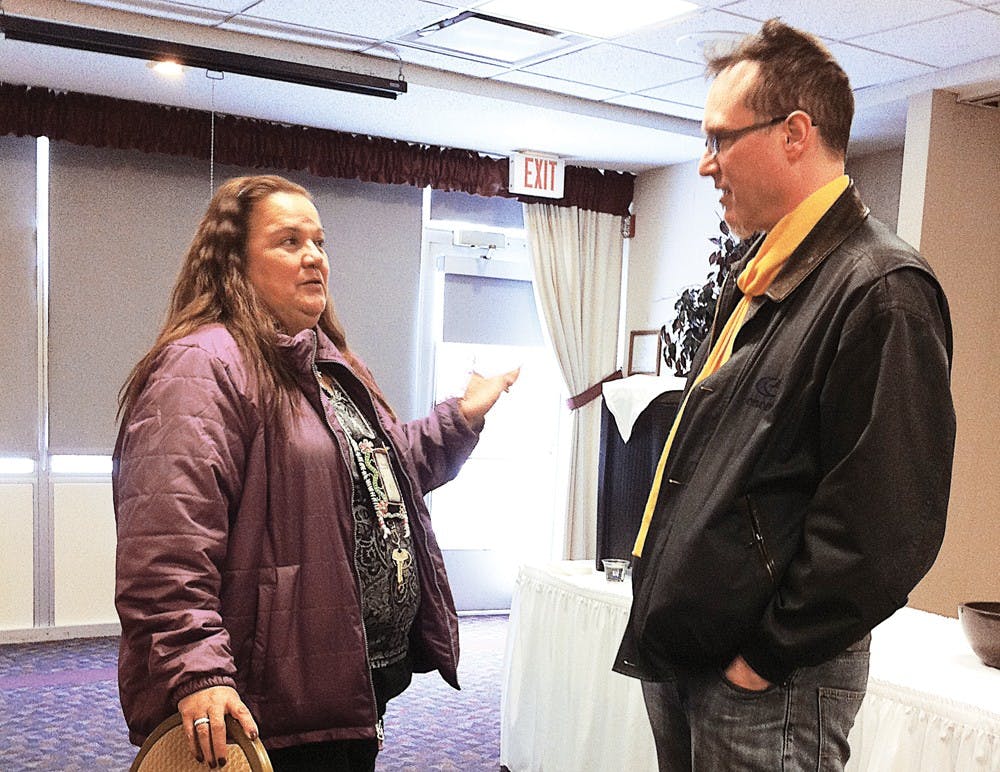Soup and Substance event links archaeology with spirituality

Native American Heritage Month continued with a Soup and Substance event Thursday that opened students' eyes to the peril facing Native American archaeological sites today.
Sponsored by the Office of Diversity Education, Native American Programs and the Ziibiwing Cultural Center in Mount Pleasant, the event was held at noon in the Bovee University Center Terrace Rooms. Titled "Torn: Rediscovering California's Stolen Heritage," it featured free soup and rolls and a documentary presentation followed by a discussion from Judy Pamp, the assistant director of the Ziibiwing Cultural Center.
"The knowledge you pick up in life is not yours alone," Pamp said. "How are you going to use that knowledge not only to create the life that you're meant to create, but how are you going to share that knowledge with others? How are you going to use that knowledge to give back to your family, to your community?"
Students and community members gathered at the were presented with issue of archaeological sites all over the country being looted and vandalized. Often, as the documentary pointed out, these vandals go after and steal carved symbols in the rock called petroglyphs, many of which are hundreds and even thousands of years old. The symbols hold cultural and spiritual messages left by Native American ancestors.
By using large, powerful saws, looters remove the petroglyphs from the face of rock walls, taking with them not only a priceless artifact but also valuable information, knowledge and an important link in the history of Native Americans.
While laws such as the Archaeological Resources Protection Act of 1979 have been put in place to punish those who are caught looting or damaging sites like those containing petroglyphs, they have not been able to put a stop to people taking and uprooting pieces of Native American history.
"I bet a lot of people were surprised that picking up stuff that you find is a kind of looting. You're messing with archaeology," said David Ferris, a graduate student from Mount Pleasant.
Ferris, who is in the process of getting a certification in American Indian studies, already knew some of what was presented in the film and discussion, but is always interested in learning more about the Native American culture he lives so close to.
"Maybe you should know a little bit about your neighbors," Ferris said. "I was surprised with how much effort people went through to steal petroglyphs."
While many targeted petroglyphs are in California, Michigan boasts a spiritual site containing them in Cass City. Pamp shared with the audience stories of her visits to the site as a young child with elders from her tribe.
By explaining the cultural and spiritual importance of the petroglyphs, Pamp was able to showcase the other, nonlegal side of the issue, said Native American Programs Director Colleen Green.
"I think as students in general they should be educated on all the different aspects of the law," she said. "Judy gives a personal touch to the different laws that the documentary had shown us, and it also provides an educational outlet to our students so they can share that with their peers and their families."
Pamp said the Ziibiwing Cultural Center has been working with the state for over 15 years to educate the Department of Natural Resources on the proper way to maintain Michigan petroglyphs, both physically and spiritually, the way tribes have done for hundreds of years.



